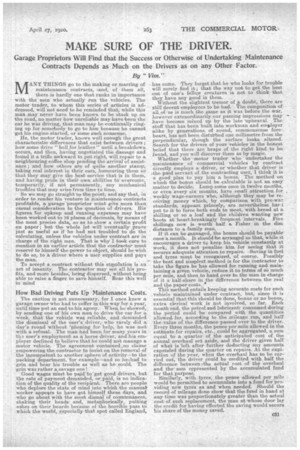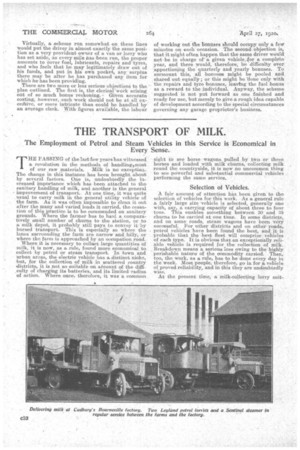MAKE SURE OF THE DRIVER.
Page 15

Page 16

If you've noticed an error in this article please click here to report it so we can fix it.
Garage Proprietors Will Find that the Success or Otherwise of Undertaking Maintenance Contracts Depends as Much on the Drivers as on any Other Factor.
By "Vim."
MANY THINGS go to the making or marring of maintenance contracts, -and, of them all, there is hardly one that ranks in importance with the men who actually run the vehicles. The motor trader, to whom this series of articles is addressed, will not need to be reminded that, while this man. may never have been kn,own to be stuck up on the road, no matter how unreliable may have teen the car he was driving, that man may be 'continually ringing up for somebody to go to him because he cannot get his engine started, or some such nonsense. He, the motor trader, knows well enough the great characteristic differences that exist between drivers ; how some drive "hell for leather" until a breakdown occurs, and then, having negotiated -the damage and found it a trifle awkward to put right, will repair to a neighbouring coffee shop pending the arrival of assistance ; and how others are of quite another stamp, taking real interest in their cars, humouring them so that they may give the best service that. is in them, and having pride in their own abilities to overcome, temporarily, if not permanently, any mechanical troubles that may arise from time to time. So we may go straight to the point, and say that, -in order to render his venture in maintenance contracts profitable, a garage proprietor Tnust give more than casual consideration to the question of drivers. His figures for upkeep and running expenses may have been worked out to 16 places of decimals, by means of the most precise data, BO as to show a certain profit on paper ; but the whole lot will eventually prove just as useful as if he had not troubled to do the calculating, unless the vehicles under contract are in charge of the right men. That is why I took care to mention in an earlier article that the contractor must reserve to himself the power to object, Should he wish to do so, to a driver where a usei supplies and pays
e man. , To accept a contract without this stipulation is an act of insanity. The contractor may see all his pro
fits, and more besides, being dispersed, without being able to raise a finger to save himself. Bear this well in' mind How Bad Driving Puts Up Maintenance Costs.
The caution is not unnecessary, for I once knew a garage owner who had to suffer in this way for a year, until time put an end to his agony. When he showed,. by sending one of his own men to drive the car for a week, that the vehicle waa reliable, and demanded the dismissal of the user's driver, who rarely did a. day's round without 'phoning for help, he was met with a refusal. The man had been for many years in tha user's employment as a horse -driver, and:his employer declined to believe that he could not manage a motor vehicle. The agreement contained,no clause empowering the contractor to insist on the removal of the incompetent to another sphere of activity—to the packing department, for example—and so heihad to grin and bear his trouble as well as he could. The -grin was rather a savage one ! Good wages must be paid to get good drivers, but the rate of payment demanded, or _paid is no indication of the quality of the recipient There are people who deplore the state of mind into which the manual, worker appears to have got himself these days, and who go about with the most dismal of countenances, shaking their beads and, metaphorically, putting ashes on their beards because of the horrible pass towhich the world, especially that spot called England,
• has come. They forget that he who looks for trouble will surely find it ; that the way not to get the best out of one's fellow creatures is not to think that they have any good in them. Without the slightest tremor of a doubt, there are
still decent employees to be had. The composition of all,of Us is much the same as it was before the war, however extraordinarily our passing impressions may have become mixed up by the late -upheaval. The stuff that has been built into -workman and employer alike by generations of sound, commonsense forebears, has not been distnrbed one millimetre from the perpendicular, though the .surface looks. altered. Search for the drivers of your vehicles in the honest belief that there are heaps of the right kind to be found, and you will -discover them as by magic.
Whether the motor trader who undertakes the maintenance of commercial vehicles by contract ciirectly employs a driver, or whether that driver is -the paid servant of the contracting user, I think it is
a good plan to pay him a bonus. The method on_ which the bonus should be calculable is not an easy matter to decide. Lump sums once in twelve months, or even every six months, have small attraction for weekly wage-earners who, although they may be receiving money which, by comparison with pm-war standards, appears princely, are nevertheless haai put to it to force both ends to meet, with bread at a shilling or so a loaf and the children wanting new boots at heart-breakingly frequent intervals. Five shillings now is worth half a Fisher in the dim
. distance to a family man. if it, can be managed, the bonus should be payable once a month. It should 'be arranged so that, while it encourages a driver te keep his vehicle constantly at work, it does not penalize him for seeing that it secures adequate attention to repairs. Saving in fuel and tyres must be recognized, of course. Possibly the best and simplest method is for the contractor to take the figure he has allowed for running and maintaming a given vehicle, reduce it to terms of so much per mile, and then to hand over to the man in charge of it a half-share in the difference between the real and the paper costs. •
This method entails keeping accurate costs for each vehicle maintained wider contract, but, since it is essential that this should be done, bonus or no bonus, extra clerical work is not involved, so far. Each month end, the petrol and lubricant:-consumed during the period could be compared with the quantities allowed for according to the mileage run, and half the value of the difference passed over to the driver. Every three months, the pence per mile allowed in the estimate for repairs, etc., could be aggregated, a. sum equal to a quarter of the anticipated cost of the annual overhaul set aside, and the driver given half of what is-left after further deducting any amounts expended during the quarter on repairs. At the expiration of the year, when the overhaul has to be carried out, the driver could be credited witi half the difference between ,the actual cost of the overhaul and thesum represented by the accumulated fund for that purpose. Similarly, with tyres, the pence allowed per mile would be permitted to accumulate into a fund for providing new tyres as and when needed. Should the Tecord of mileage done show that the fund in hand at any time was proportionately greater than the actual cost of such replacement, the man at whose door lay the credit for having effected the saving would secure Ins share of the money saved. Virtually, a scheme run somewhat on these lines would put the driver in almost exactly the same position as a very provident owner of a van or lorry who has set aside, as every mile has been run, the proper amounts to cover fuel, lubricants, repairs and tyres, and who feels that he may legitimately draw out of his funds, and put in his own pocket, anysurplus there may be after he has purchased any item for which he has been providing. There are two more or less serious objections to the plan outlined. The first is, the clerical-work arising oat of so much bonus reckoning. Given accurate costing, however, such work should not be at all excasive, or more intricate than could be handled by an average clerk. With figures available, the labour of working out the bonuses should occupy only a feW minutes on each occasion. The second objection is, that it might often happen that the same driver would not be in charge of a given vehicle ,,or a complete year, and there would, therefore, lie difficulty over .apportionIng the quarterly and yearly bonuses. To surmount this, all -bonuses might be pooled and shared out equally; or this might be 'done only with the repairs and tyre bonuses, leasing the fuel bonus as a reward to the ,individual. Anyway, the schema suggested is not put forward as one finished and ready for use, but merely to give a rough idea capable of development according to the special circumstances governing any garage proprietor's business.




























